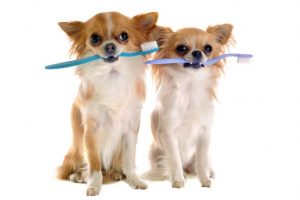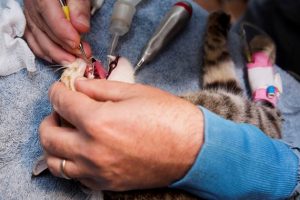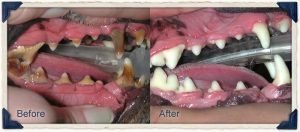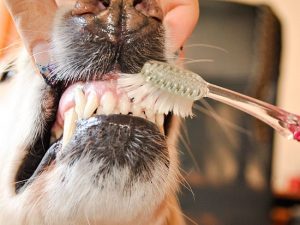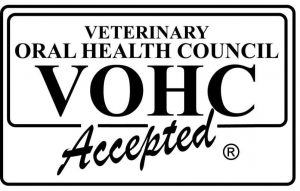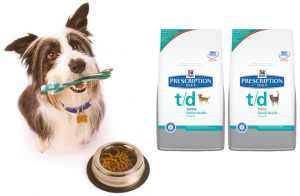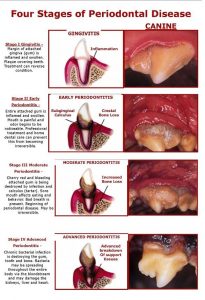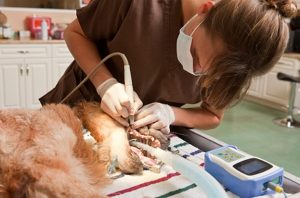February Is Dental Month!
February is dental health month, which means it’s time for your pet to open wide for a dental examination! Just like in people, if plaque and tartar build up and are left untreated it can progress to painful periodontal disease.
Dupont Veterinary Clinic offers a discount for dental exams during the month of February to honor dental health month. Be sure to schedule your pet a dental exam soon because spaces do fill up quickly!
Signs of oral and dental disease in pets
- Bad breath
- Loose teeth or teeth that are discolored or covered in tartar
- Your pet avoiding having his or her mouth touched
- Drooling or dropping food from the mouth
- Loss of appetite or loss of weight
- This combination can be due to many different diseases and it is important to have an examination by a veterinarian right away.
Here are five tips on how to keep your pet’s teeth and gums healthy:
- Bad Breath
If you cannot stand your pet’s breath, do not ignore it! Bad breath in pets is a warning sign for periodontal disease. The tartar and bacteria that build up cause this foul odor and it is important to remove the bacteria sooner rather than later. The bacteria eat away at the gum line and work their way into the blood stream, showering your pet’s body with a lot of bacteria! Here is a before and after image of a pet with significant tartar and periodontal disease (notice the red and inflamed gum line at the base of the teeth on the before image).
- Brush Your Pet’s Teeth
It may be difficult at first to start this routine, but with enough patience and tasty treats, you can gradually train your pet to accept the tooth brush and pet toothpaste. Start by letting your pet smell the toothbrush and the toothpaste, then gradually work your way to brushing for 30 seconds on each side of the mouth at least every other day.
Caution: Human toothpaste is not safe for pets! Be sure to use a pet approved product.
- Consider Dental Toys, Treats, and Food
There are treats, toys, and food specifically designed to promote oral health; however, they are not as effective as brushing your pet’s teeth. Be sure to look for the Seal of Acceptance from the Veterinary Oral Health Council to make sure that the product meets the standards for effective plaque and tartar control.
Stop in to see your veterinarian at Dupont Veterinary Clinic to ask them about the prescription diet specifically designed to promote oral health.
- Dental Exam
Pets need to have their teeth and gums checked regularly by a veterinarian, just like humans do. A cursory exam can be performed by your vet without sedation, but for a complete dental evaluation your pet will have to be placed under anesthesia. During the dental exam the veterinarian will check the head and neck for any abnormalities, look for any broken or cracked teeth, stage your pet’s dental disease (the severity of tartar, gum disease, redness and inflammation), and look for any other abnormalities in the oral cavity, such as cancerous lumps or bumps.
- Don’t let Anesthesia Stop you From Getting a Dental Cleaning
In order to perform a thorough examination of your pet’s teeth and gums, remove the plaque and tartar, and really clean your pet’s pearly whites, anesthesia is required. Placing your pet under anesthesia sounds scary, but in fact, the procedure has never been safer or more comfortable for your pet. Before the anesthesia even begins, we perform pre-screening blood tests to ensure that your pet is healthy enough for the procedure. There are numerous benefits of dental cleaning that outweigh the risks of anesthesia.
We at Dupont Veterinary Clinic will keep you informed throughout the procedure. There will be a meeting at the time of drop off with a veterinary technician; after the bloodwork is performed, if any health conditions are encountered, you will be contacted prior to anesthesia. After your pet’s teeth are examined and cleaned you will again be contacted when your dog or cat has recovered from anesthesia.
We at Dupont Veterinary Clinic aim to provide the best possible care for your pet, which includes regular dental examination and cleaning. Contact your veterinarian with any questions regarding dental cleaning and to schedule your pet’s dental exam today!
By Ashley Dawes, DVM

